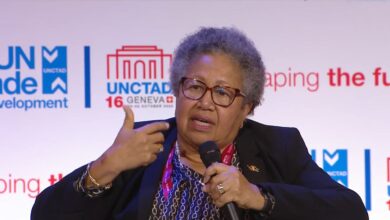(CARICOM Secretariat, Turkeyen, Greater Georgetown, Guyana) The Secretary-General of the Caribbean Community, His Excellency Edwin Carrington, on Tuesday, told some of the Region’s negotiators and policy makers to be resolute and vigilant in their positions for a New Climate Change Agreement.
This resolve must be maintained even while consulting with other Parties of similar interests in order to achieve “the greatest solidarity among Member States to advance the Region’s Climate Change agenda.”
Secretary-General Carrington was addressing the opening ceremony of a special Ministerial Meeting at the Bay Gardens Hotel in Castries, Saint Lucia. The Meeting – supported by the Government of Spain – was organised by the CARICOM Secretariat in tandem with the CARICOM Climate Change Centre (CCCCC) to further define the Region’s Climate Change priorities for the negotiations leading up to, and at the 15th Meeting of the Conference of Parties (COP15) to the United Nations Framework Convention on Climate Change (UNFCCC) set for December 7-18 in Copenhagen, Denmark.
At COP15, CARICOM is expecting a new global agreement that will favour its Member States in their mitigation and adaptation responses to the effects of Climate Change.
Mr Carrington, explaining that all existing meteorological models had predicted that the Caribbean Region would experience significant negative impact from climate change and that Small Island Developing States (SIDs) were especially vulnerable, underscored the critical importance of including a development component in the Region’s climate change policy.
In this regard, the Secretary-General called for a redesigning of the global architecture on Climate Change to strengthen developing countries. He expressed optimism that at the UN Climate Change conference, the appropriate action would be taken to establish a new framework for global cooperation on Climate Change. That Agreement, he asserted should address the basic requirements for the survival of SIDs, especially in relation to five critical building blocks of a targeted reduction in Green House Gas emissions, mitigation and adaptation, transfer of technology, capacity building and finance.
In order to resolve those key issues, the Secretary-General said, there must be intervention at the highest political level and all efforts must be made to undertake the technical work necessary to underpin the positions which Member States would be seeking to advance at Copenhagen.
Noting the collaboration of Central America with the Community, Mr Carrington encouraged further consultations with “like-minded and similar-circumstanced countries,” which he stated could provide vital inputs into the preparatory process of Member Countries.
“The Region’s policy makers must maintain and continue using their contacts with world leaders and other policy makers to advance the Region’s Climate Change agenda and to ensure agreement is reached on the core issues of importance to us,” he declared.
Secretary-General Carrington urged policy makers and negotiators attending the Ministerial Meeting to make every effort to ensure that the Community‘s policy position reflected the concerns of all Member States, including those with special interests such as the Reduced Emissions from Deforestation and Degradation (REDD) mechanism.
“To this end,” he reiterated, “the Region’s Policymakers must be vigilant and remain steadfast in its position for a new global Climate Change agreement.”
The Ministerial conference was also addressed by the Prime Minister of Saint Lucia, the Hon. Stephenson King, who has lead responsibility for Sustainable Development in the Quasi-Cabinet of the CARICOM Conference of Heads of Government and Guyana’s Minister of Agriculture, Hon. Robert Persaud who represented the CARICOM Chairman, H.E. Bharrat Jagdeo.
It provided a forum for the political directorate and other policy makers within CARICOM to become involved in the negotiations processes; appreciate a better understanding of the key issues at stake and be able to give strong support to the positions of the negotiating teams.





